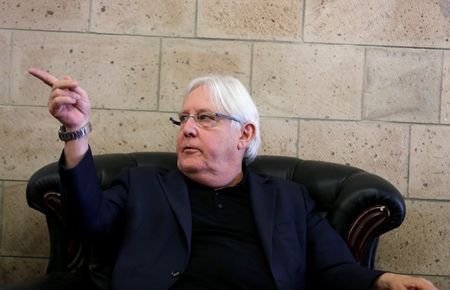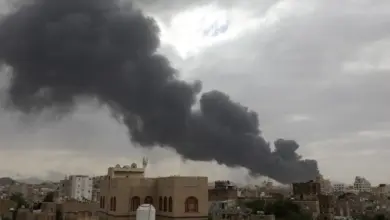
Yemen’s warring parties have offered “concrete ideas” to achieve peace, U.N. envoy Martin Griffiths said on Wednesday after meeting Iran-aligned Houthi leaders in the capital Sanaa.
Griffiths has been conducting shuttle diplomacy in search of a political solution that would avert an all-out military assault on the Houthi-held port city of Hodeidah by a Saudi-led coalition that entered Yemen’s conflict in 2015 to try to reinstate the exiled, internationally recognized government.
His efforts have succeeded so far in pausing the offensive launched last month by United Arab Emirates-backed forces to take Hodeidah, a Red Sea port and main conduit for supplies to Houthi-held areas in northern and western Yemen including Sanaa.
The international community fears the offensive on Hodeidah port will aggravate the humanitarian crisis in Yemen and touch off a famine affecting up to 8.4 million people believed by U.N. officials to be now on the verge of starvation.
“All parties have not only underscored their strong desire for peace, but have also engaged with me on concrete ideas for achieving peace,” Griffiths told reporters in Sanaa airport at the end of a three-day visit to the Yemeni capital.
“I am especially thankful to (Houthi leader) Abdel Malek al-Houthi whom I met yesterday (Tuesday) for his support and the fruitful discussion we held,” he said.
Griffiths said he would brief the U.N. Security Council on Thursday on the outcomes of his discussions and that he hoped to meet President Abd-Rabbu Mansour Hadi “very soon”, for a second round of talks with his displaced government.
Griffiths gave no details on the “concrete ideas”, and there was no immediate comment from the two sides.
Last week, Griffiths met Hadi in Aden in south Yemen, the temporary headquarters of the exiled government.
U.N. efforts may face a major challenge over the control of Hodeidah city and its port.
The Houthis have offered to hand over management of the port to the United Nations as part of an overall ceasefire in Hodeidah province. The Arab coalition says Houthi combatants must leave Yemen’s western coast entirely, including Hodeidah city, but the Houthis have already said they would not withdraw.
Griffiths has not suggested who would maintain military control of the city under any U.N. management.
The Houthis, who hold Yemen’s most populated regions, deny accusations that they are proxies of Iran in a regional struggle for dominance with the Saudis, saying they are fighting rampant corruption and foreign invaders in the Arabian Peninsula state.



